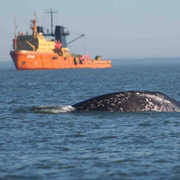IUCN seeks whale conservation experts to advise on energy development impacts
IUCN seeks applications from qualified individuals to serve on its independent scientific and technical advisory panel to minimize impacts on western gray whales during offshore oil and gas development and beyond in Sakhalin, in the Russian Far East. The application deadline is 20 August 2015.

Photo: Dave Weller
The experts will be appointed to serve on the panel from October 2015 to December 2016.
The expertise required ranges from general cetacean biology, population assessment and modelling to bio-acoustics and environmental monitoring. IUCN is also looking for expertise related to marine mammal response to disturbance and mitigation measures, especially but not exclusively with respect to oil and gas activities, as well as experience interpreting relevant Performance Standards of the International Finance Corporation / World Bank Group on environmental and social sustainability.
During the past decade, the overall goal of the Panel has been the provision of objective independent advice on the conservation and recovery of the western gray whale population off Sakhalin Island, just north of Japan, in the Russian Far East.
The Panel’s core principles are independence, transparency, accountability and engagement.
The full details on the open positions, the requirements and the application form to serve on the Western Gray Whale Advisory Panel (WGWAP) are available on the IUCN HRMS portal.
For more information, please contact Ms Anete Berzina at IUCN: anete.berzina@iucn.org
About WGWAP
Since 2004, IUCN has worked with Sakhalin Energy in order to provide advice and recommendations on how the company can minimize risks associated with its operations on the western gray whale population and its habitat. As one part of this broad initiative, in 2006 IUCN created a permanent panel of independent scientists – the Western Gray Whale Advisory Panel (WGWAP). The Panel provides scientific advice and recommendations on the company’s operational plans and mitigation measures of its Sakhalin-2 project, one of the world's largest oil and gas operations. Through this constructive cooperation a unique holistic set of state-of-art monitoring and mitigation measures have been developed to reduce risks to the whales. The project demonstrates how critically endangered species can coexist with the economic development and aims at the development of better scientific knowledge of the species, as well as international best practices for the environmental management aspects of oil and gas operations in environmentally sensitive habitats such as Sakhalin.
The WGWAP is co-chaired by Dr Randall Reeves, Chairman of the Cetacean Specialist Group at the IUCN Species Survival Commission, and Dr Greg Donovan, Head of Science at the International Whaling Commission.




